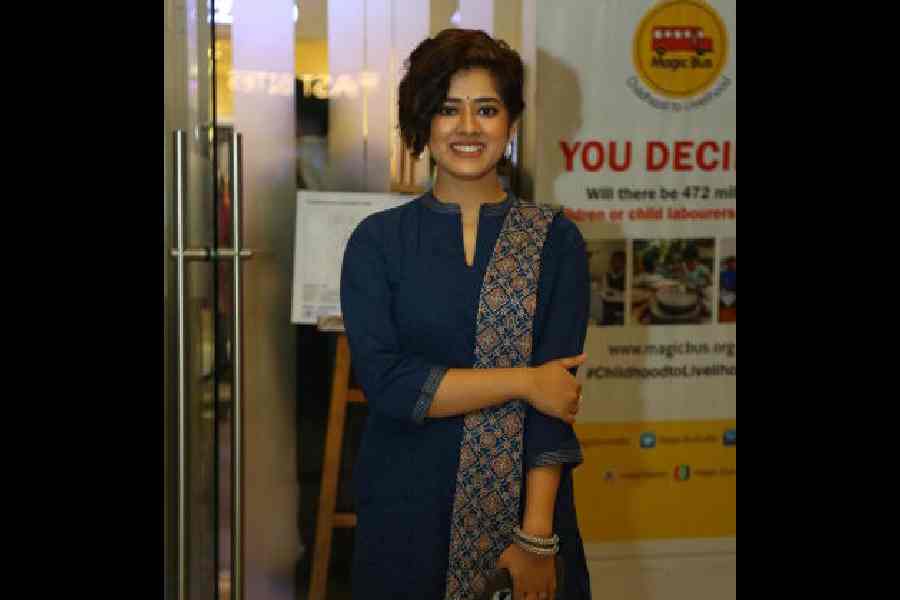Suman Ghosh’s Kabuliwala is like the winter sun, spreading warm rays of tenderness in a shadowy season. It successfully heals the persistent wound by presenting the soul-stirring bond between Mini and Rahmat. Ghosh has given a new wrapping to this timeless, heart-wrenching tale — deeply rooted in every Bengali’s emotions — by Rabindranath Tagore. This film is meticulously woven by Ghosh with numerous nuances and emotions.
The plot of Ghosh’s Kabuliwala is set in the mid-1960s, against the socio-political turmoil between India and Pakistan, and Rahmat and little Mini successfully captivate the audience throughout the film. Ghosh, who had brought Tagore’s work and philosophy on screen through his film Kadambari, yet again makes a significant choice by adapting Kabuliwala on screen in 2023, at a time when the wound of hate is open worldwide and the torchbearers of divisive politics are festering on that wound.
The way he has portrayed the heart-tugging moments between Mini and her Kabuliwala makes the attempt successful. It must have been very challenging for Ghosh to bring back that period on screen in 2023, but he has brilliantly done it. Subhankar Bhar, the cinematographer, captured the spirit of the era beautifully through his lens and light. He creates magic in every shot.
The background music brings out the ocean-deep innocence of the film. The songs hold a special place in the audience’s hearts, especially Kabul manush (Anirban Bhattacharya) and Khushi ki Eid (Javed Ali and Ishan Mitra). The last song used in the film, Bhaabo jodi (Arijit Singh), feels like a cold breeze and leaves the audience with goosebumps. Composer Indraadip Dasgupta adds a new dimension to this film with an epiphany of emotions through Khushi ki Eid. This song carries a special message of eliminating the thread of discrimination based on caste and creed, and promoting harmony among all religions.
This film encapsulates the heartwarming bond between Mini and her Kabuliwala, an Afghan dry fruit seller who comes to India, leaving his daughter in Afghanistan. He starts off selling asafoetida, walnuts, and raisins to make a living with a fragmented heart, but his heart gets filled with bliss again when he meets Mini. However, tragedy separates them. The delightful moments between them undoubtedly bring tears to the eyes.
Legendary actor Mithun Chakraborty excels in every scene with his stellar performance. One can’t help but recall Chhobi Biswas’s indomitable performance which is etched in the memory of every Bengali but Chakraborty takes a completely different turn and creates his own path for the next generation to remember Rahmat.
Mini, played by Anumegha Kahali, is an absolute show-stealer. Immensely endearing and charming, she wins hearts through her ever-charming innocent performance. The portrayal of Mini’s mother Sneha, perfectly done by Sohini Sarkar, never fails to surprise us with her nuances. She looks astonishingly beautiful yet gullible on screen. Her intonation while chanting Lokkhi’r Panchali would doubtlessly help you to regain childhood memories.
In the character of Mini’s father (Aurobindo), Abir Chatterjee delivers a steadfast performance and creates a sense of dependability. Gulshanara Khatun (Mokkhyoda) and Sumit Shamaddar (Bhola) do justice to their pivotal roles. Adhirbabu (Krishnendu Dewanji) deserves special mention. Production design by Tanmoy Chakraborty meticulously brings back the period on screen. The costumes are designed flawlessly, maintaining the film’s originality.
Ghosh has given time to explore the geo-political uncertainties of the mid-1960s in the first half. However, the second half is more captivating and precisely edited.
As the film comes to a close, it leaves behind a long trail of thoughts and questions, an after-effect drenched in melancholia but with a new hope to dream again in this faltering world. The tune of Louis Armstrong’s What A Wonderful World lingers in the mind as an audience member and as a citizen, I recall the beautiful lines: The colours of the rainbow/ So pretty in the sky/ Are also on the faces/ Of people going by/ I see friends shaking hands, saying, “How do you do?”/ They’re really saying, “I love you”/ And I think to myself, what a wonderful world.











